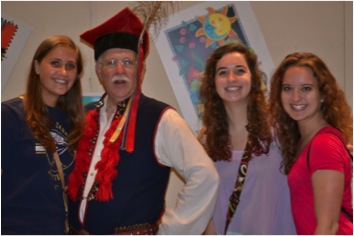By Caroline Zybala – 2014
While at the International Festival in Raleigh, NC, our group kept seeing this man, wearing some traditional ethnic attire and a hat with a large feather, walking around the convention center. We finally decided to approach him and figure out his story. We figured he would be a good character to interview for our project. Quickly, we discovered that this individual was a wealth of information about Highway 64 and the evolution of North Carolina over the years. Alvin M. Fountain, 2nd, (“How southern can I be?”), lives in Raleigh, North Carolina and grew up with Highway 64 being an important travel route.
“We used Highway 64 to get to the beach. I mean, it goes to both the beach and the mountains, but the trip to the beach is only two hours, compared to the four hours to the mountains.” But travel was not the only use of this road—Fountain also used the road to travel south to Charlotte on occasion. Looking around at the bustling crowd, he lowered his voice and said, “I like it because it is quieter. Until you hit the traffic!”
We all laughed, and then we changed topics to figure out what had prompted the outfit. “I am actually here with the Polish group. I am the Honorary Consul of the Republic of Poland for North Carolina. But, I am not Polish. I am your typical southern, white, Anglo-Saxton Protestant. But I studied German in high school and got really interested in the cultures over there.” Referring to his hat, he explained it was created by local, elderly Polish-American ladies, who bought the materials themselves. “This is a traditional Polish hat. They made it back in 1986 for the opening for the International Festival. I was there for that. I’ve actually been to the festival every year. Well, in 2010, I did miss the festival proper, but I helped set it up, so I count it. My wife had her 50th high school reunion.”
At this point in the conversation, Alvin tried to think of other things to tell us about Highway 64 and North Carolina history. He explained how his family had been in North Carolina for over 300 years, and he could remember back to 1949, when North Carolina was very different. “There were almost no Catholics in North Carolina when I was growing up. When Kennedy was running for president, they were looking at the breakdown of Catholics in each of the states. North Carolina actually had the smallest percentage. But now, things have really changed. Right by Siler City, there is a giant Catholic church that looks like it could be right out of Mexico.”
When prompted to explain why this changed happened, Alvin responded, “Culturally, the state of North Carolina has changed greatly. When I was growing up, everyone was a WASP.” He quickly explained the acronym (White Anglo-Saxton Protestant) because we all must have shown some real confusion in our expressions. “The other group of people was what I like to call BAAP—Black African American Protestant.”
“But now, we have so many other people in the state, like people in the Polish club. The Research Triangle Park is really influenced this change. When companies moved down here, it would really shake up the whole Triangle. A big one was IBM, which brought people from the upper Midwest and upstate New York. Overall, Raleigh has really grown.”
We asked him for his final thoughts on Highway 64 in regards to his life, and he thought for a moment. Squinting his eyes, he said, “64 is really a sort of central road. It can be a connecting route if you want to make your trip worthwhile and get to point A to point B. The road can take you east to the zoo, and to Rocky Mount—that is where my mother grew up. Or you can head west, and the road splits at Zebulon. There are parts when it turns into single lanes, and the traffic really slows down. Then you reach the coast and Kill Devil Hills.”
After talking briefly about the project we were completing, we were able to takea picture with Alvin. I mean, it’s not everyday you get to meet a WASP, Polish Honorary Consul!

